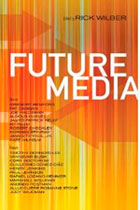Reviewed by Jacob Knowles-Smith

Norman Mailer hated television. He distrusted email. He even hated plastic. Marshall McLuhan was probably right, to some extent, to suggest that Mailer had a Victorian attitude towards technology. Other critics, past and present, will probably find sympathy with Mailer’s assertion that man’s relationship with technology is some kind of Faustian pact. You can watch them arguing about it all – two minds running on autopilot, having two different conversations – online after reading this article, on a web-based magazine, of a book I read as a PDF. Chances are, Mailer would hate all of this too, and we can probably guess his reaction to his books being available on Kindle. But chance, guesses and that repeated ‘probably’ are the key to the (e-)book under review; as Future Media is a collection of sci-fi fiction and non-fiction all concerned with the effects of media on its users and its ultimate potentialities – and is, thus, a collection more in the school of future, rather than media, studies.
There are several problems with this; predicting the future might be ‘fun’ but those predictions are very often wrong. Think of Herman Kahn and nuclear disasters or think, more pertinently, of McLuhan’s theory that technology would ultimately cause man to – somehow – revert back into a form of tribalism. As a lay reader of media studies, it’s hard to see how this relates to his other famous theory of the ‘Global Village’. Future Media is book-ended, appropriately enough given his lasting influence on media studies, by McLuhan’s work, but this is not enough to give a clear picture of what McLuhan was actually getting at. Often misunderstood even when read at length, in such small doses as this his work simply leaves you wondering whether either you’re to dumb to grasp the ideas or if he was a mere peddler of jargon.
This raises a question about Future Media itself: who is the book for? There’s no general audience for a collection of, on the one hand, science fiction – Huxley and Bradbury are here – and, on the other, non-fiction about media. However, if it’s for media studies students, and I have no idea how those departments are run, are they permitted to quote sci-fi stories in essays?
A collection like Future Media is the book equivalent of a search engine: chapters culled from their original body to prove/illustrate a point instead of immersing yourself in the original work – much like looking for information online. Information overload and the disposability of this information are just two consequences of the pact with technology – as Norman Mailer (again) said, “if you want to learn something, get thee to a book”. Yet the benefits of technology are so apparent that need not be mentioned here. Mailer’s point, however, is discussed in Future Media by Nicolas Carr in ‘Is Google Making Us Stupid?’ This is one of the standout (non-fiction) pieces and describes the “chipping away [of] my capacity for concentration and contemplation” – something which most people will surely be able to relate to. Who isn’t a wizard when it comes to collecting snippets of information on anything from here and there and piecing them all together to suit our purpose, rather than spending valuable time reading a book? Carr informs us that this is known as “power browsing” and is fast becoming the dominant way in which users access information. He also highlights that due to this rapid information gathering – which includes text messages, emails, etc. – we are all probably reading more than ever before in history.
This is, of course, a different type of reading. The Kindle was mentioned earlier and indeed it, and any other ‘reading device’, is a more superficial form of reading. It may be convenient to have hundreds of books on one device but once you’ve got your free complete Shakespeare downloaded next to your other holiday-reads, will you ever look at them? Harold Bloom, the great literary critic, called digital books the “death of education” and in an age when reading is more and more superseded by television, video games and the internet, digitalisation will make books even more disposable – just as the MP3 killed the album.
Future Media has a lot of interesting work in it but probably – dare I say? – nothing you couldn’t find with a search engine, if you were interested. The ultimate trouble with futurology, besides the low success-rate, is that most of the things predicted are never as wondrous, elegant, or, even, horrific as the ultimate product. Consider the future idylls conjured up by the sixties; jet packs, flying cars, homicidal robots, computers bigger than the underwater houses they serve? You can keep them. I’ll stick with my iPhone.
—–
Marshall McLuhan and Norman Mailer take on the future
